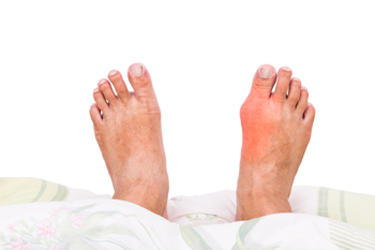 The medical condition that is known as a bunion will typically develop gradually, and it is considered to be a bone deformity. The foot structure can change, and may occur as a result of wearing shoes that do not have ample room for the toes to move freely in. The lack of room may push the big toe toward the second toe, which may cause the joint in the bottom of the big toe to protrude. Additionally, genetic factors and medical conditions that can include arthritis may play a significant role in developing a bunion. Common symptoms that are associated with this condition can consist of pain or numbness, corns and calluses that may develop on the affected area, and the toe may have limited range of motion. If you notice a bunion that is beginning to develop, it is strongly suggested that you schedule a consultation with a podiatrist who can offer treatment techniques.
The medical condition that is known as a bunion will typically develop gradually, and it is considered to be a bone deformity. The foot structure can change, and may occur as a result of wearing shoes that do not have ample room for the toes to move freely in. The lack of room may push the big toe toward the second toe, which may cause the joint in the bottom of the big toe to protrude. Additionally, genetic factors and medical conditions that can include arthritis may play a significant role in developing a bunion. Common symptoms that are associated with this condition can consist of pain or numbness, corns and calluses that may develop on the affected area, and the toe may have limited range of motion. If you notice a bunion that is beginning to develop, it is strongly suggested that you schedule a consultation with a podiatrist who can offer treatment techniques.
If you are suffering from bunion pain, contact one of our podiatrists of Sayville Foot Care. Our doctors can provide the care you need to keep you pain-free and on your feet.
What Is a Bunion?
Bunions are painful bony bumps that usually develop on the inside of the foot at the joint of the big toe. As the deformity increases over time, it may become painful to walk and wear shoes. Women are more likely to exacerbate existing bunions since they often wear tight, narrow shoes that shift their toes together. Bunion pain can be relieved by wearing wider shoes with enough room for the toes.
Causes
- Genetics – some people inherit feet that are more prone to bunion development
- Inflammatory Conditions - rheumatoid arthritis and polio may cause bunion development
Symptoms
- Redness and inflammation
- Pain and tenderness
- Callus or corns on the bump
- Restricted motion in the big toe
In order to diagnose your bunion, your podiatrist may ask about your medical history, symptoms, and general health. Your doctor might also order an x-ray to take a closer look at your feet. Nonsurgical treatment options include orthotics, padding, icing, changes in footwear, and medication. If nonsurgical treatments don’t alleviate your bunion pain, surgery may be necessary.
If you have any questions, please feel free to contact our office located in Sayville, NY . We offer the newest diagnostic and treatment technologies for all your foot care needs.
